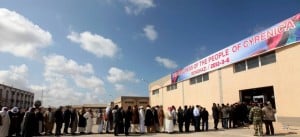
NTC leader Mustafa Abdul Jalil has said that the creation of a council aiming to administer the region of Cyrenaica threatens national unity. He threatened that the Libyan authotities would defend national unity “with force” if necessary.
We are not prepared to divide Libya”, he said, insisting that those behind the move engage in dialogue.
The congress was opposed to the NTC’s constitution plans, wants more representation for the east in June’s constituent assembly elections and specifically wants the adoption of Libya’s 1951 constitution, in which Libya was a federal state, divided into Cyrenaica, Tripoliitania and Fezzan.
In 1964, the constitution was amended and Libya became a unitary kingdom with 10 regions.
The legal position of the new council is unclear. The declaration adopted in Benghazi said the “Cyrenaica Provincial Council is hereby established … to administer the affairs of the province and protect the rights of its people”.
Much will depend on whether the council issues any decisions and whether anyone accepts them.
Its existence is seen by many more as an expression of discontent in the east and resentment that while it was for long the bastion of the revolution against Qaddafi last year, it is again being sidelined. The resentment has been strengthened by Benghazi’s continuing physical deterioration. Unlike Tripoli where infrastructure and services such as garbage removal, drainage and electricity supply work reasonably well, Benghazi’s — already bad to start with — have become progressively worse over the past year.
Federalism has become an even hotter issue of debate across Libya in the past couple of weeks than the power and role of the militias. Many people are bitterly opposed, seeking it as a precursor to a break-up of the country. They cite South Sudan as an example. Much of the opposition is in Tripoli.
However, there are those in Benghazi and the east who are also opposed top it. On Monday, the first anniversary on the establishment of the NTC, there were pro- and anti-federalism demonstrations in the city.
There were small anti-federalism protests elsewhere in the east.
Most of those opposed to federalism nonetheless say they want decentralisation although many do not say what that means.
A number of the new parties have publicly stated their opposition to any return to Libya being divided into three state with their own governments and legislatures. The Muslim Brotherhood, the Democratic National Party, the Free National Party, the Libya Revolutionists Union, the Union of 17 February revolutionists, and the Democratic Libyan Youth Society put out a joint statement condemning federalism.
It said that “in order to change the central system and individualism of the former regime, there needs to be a legal decentralised system where local authorities of every region will have their freedom to run their own affairs and serve their own citizens”. The parties were opposed to discrimination based on regional differences and said they would resist any calls or plans aiming to break national unity or dividing the country.
In response to the demonstrations against federalism, Ziad Edgem, a federalism supporter, said that what was being demanded was a normal political activity. Accusing Islamists of being behind some of the demonstrations, he said that the first decision in Cyrenaica council would be the announcement of elections in the region. Another supporter, Omar Musa Al-Fadil likewise defended the federalists’ rights to declare Cyrenaica a region. He said that the region had long been marginalized and the transitional authorities were continuing this policy. He denied that the announcement was aimed at dividing Libya.
Zubair and the new Cyrenaica council similarly state they do not want independence. The new body has said it accepts the NTC as “the country’s symbol of unity and its legitimate representative in international arenas”.
Its existence, however, is a major headache for both the NTC and the interim government already weighed down with trying to resolve the matter of the militias.
In his reaction, Jalil said that the NTC was the only legitimate authority in Libya and was recognized by the world as the only representative of the Libyan people. He suggested that there were outside forces at work, that some Arab countries were encouraging the division of Libya.
In his speech on TV on Monday night, Prime Minister Al-Kib also criticized the new council, saying: “We don’t need centralization or federalism. The King (Idris) rejected it” — a reference to the 1964 constitution which did away with federalism.
Criticism has also come from the Grand Mufti, Sheikh Sadiq Al-Ghariani. He has issued a fatwa saying that “federalism is the beginning of division, and division leads inevitably to dispute and opens the door to the conflict on many things.”
[/restrict]









